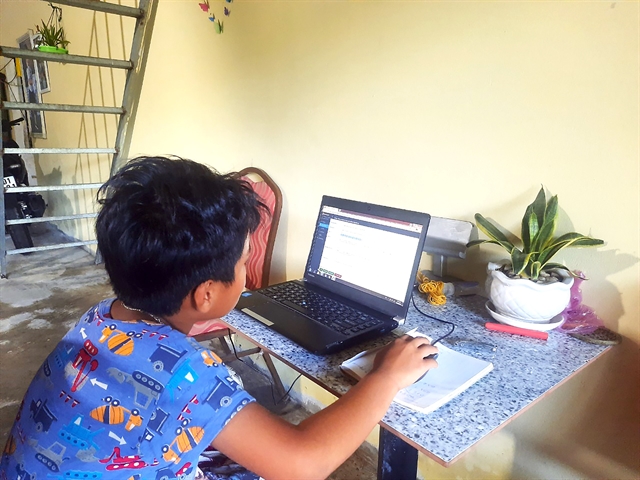 Society
Society

Realising that online learning does not benefit primary schoolchildren, Cà Mau Province authorities have been the first to look into stopping online classes for students at this level, which was well-received by both parents and teachers.

|
| The local authorities instructed educational institutions in the locality to carefully evaluate the actual situation, students’ attendance, and online learning quality before coming to the decision to halt online classes. — Photo danviet.vn |
CÀ MAU – Realising that online learning does not benefit primary schoolchildren, Cà Mau Province authorities have been the first to look into stopping online classes for students at this level, which was well-received by both parents and teachers.
Two weeks into the 2021-22 school year, Cà Mau Province took the initiative in contrast to other areas. Initially holding online classes for primary schoolchildren, Cà Mau Department of Education and Training (DoET) evaluated the data collected over two weeks of online learning and came to the decision of cancelling online learning at the primary level.
Local statistics reveal that the attendance rate in the second week of online learning reached 88.21 per cent on average, with primary students was 84.75 per cent. Among these, approximately 60 per cent of the students were studying effectively. This number is lower for younger ages.
Online learning is ineffective for a number of reasons, the assessment found, one being first-year primary students have trouble accessing the online classes without direct instruction. In addition to this limitation, teachers also encounter difficulties in contacting their parents.
Speaking to Dân Việt (Vietnamese People) newspaper, Nguyễn Minh Luân, Head of Cà Mau DoET, said the province had been proactive in building different teaching plans amid the complicated COVID-19 developments in the country as the school year started. As this is the first time Cà Mau started a school year online, Cà Mau’s DoET had to admit to its shortcomings in implementation despite the resources mobilised for remote teaching.
According to Luân, the local authorities had instructed educational institutions in the locality to carefully evaluate the actual situation, students’ attendance, and online learning quality before coming to the decision to halt online classes.
“The only thing that drove Cà Mau’s education sector to advise the provincial People’s Committee to stop online classes at the primary level is for the sake of education quality,” said Luân.
Residing in a rural area of Cái Nước District in Cà Mau Province, Nguyễn Kiều Tiên’s daughter still faced difficulties although she is in Grade 4. In the rural area, internet connections are not common and children do not have access to smartphones, which proves to be an obstacle in interaction in online classes, Tiên explained.
“My husband and I spent over VNĐ5 million buying a smartphone and signing up for 3G network for my daughter to study, but to be honest, it took us a whole week to understand all the steps to get into online classes and help my child to study,” said Tiên.
Meanwhile, parents whose children are entering Grade 1 this year collectively complained over online learning. Nguyễn Văn Sìn, in Hòa Thành Commune, Cà Mau Province, has a son who is entering Grade 1 this year. It has been a headache for the family as they don’t know how to teach their child the same way as a teacher. “It was only a few minutes until he starts crying as we made him sit and focus on studying,” said Sìn.
Parents are overjoyed at Cà Mau’s decision to halt online learning for primary pupils. In their opinion, online classes are not suitable for the actual situation, take a lot of time and effort from parents and teachers while not producing the expected results in children’s learning.
With years of experience in teaching, Nguyễn Trung Hậu, a primary school teacher at Tân Hưng Đông Primary – Secondary School in Cái Nước Commune, Cà Mau Province, agreed that online learning has posed numerous difficulties for teachers, students, and parents.
“With the complicated developments of the pandemic, online learning is appropriate but does not return high efficiency, while posing multiple challenges along the way,” said Hậu. He also agrees with the province’s decision.
“Each family owns only one or two smartphones, and parents take it with them when they go to work. The only free time for parents is also usually after 7pm, which is not convenient for the teachers to hold classes at that time,” said Nguyễn Minh Phụng, Head of the Education and Training Division in Cái Nước, Cà Mau.
The division also stated the online curriculum offers very limited effectiveness for children in Grade 1, 2, and 3, thus considering the provincial DoET’s decision the right and appropriate measure in the local context. — VNS




